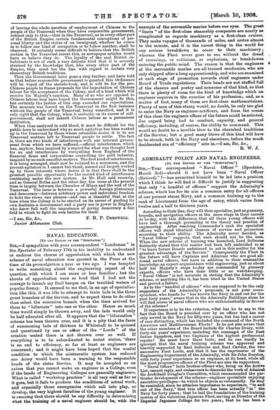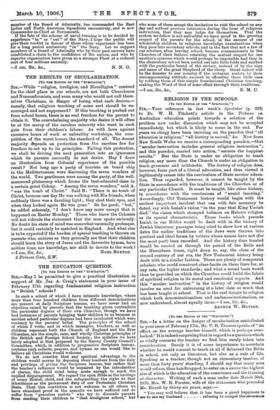ADMIRALTY POLICY AND NAVAL ENGINEERS.
LTo THE EDITOR OP THE " SPECTA.TOR..]
SIR,—Your correspondent "Naval Officer" (Spectator, March 3rd)—should it not have been "Naval Officer (Retired) "P—has permitted himself to be led into a position which I think he will find it difficult to justify in suggesting that only "a handful of officers" support the Admiralty's scheme, which has for its aim a common entry for all officers
of our present steam Navy, and a common training up to the rank of Lieutenant from the age of entry, which varies from twelve and a half to thirteen years.
According to their line, they will then specialise, just as gunnery, torpedo, and navigation officers at the same stage in their careers do to-day, with this difference, that all these young officers will have had a thorough grounding in the theory and practice of engineering. After reaching Commander's rank the specialist officers will stand identical chances of service and promotion according to their ability. The Admiralty never decided, as "Naval Officer" suggests, that such should not be the case. When the new scheme of traininc, was launched, Lord Selborne distinctly stated that this matter training been left undecided so an "to leave future Boards unfettered to act in this matter for the greatest advantage of the Service." Consequently the Fleet in the future will have Captains and Admirals who are good all- round naval officers, but have in addition to their seamanlike knowledge an expert acquaintance with engineering, just as about half his Majesty's ships to-day are commanded by gunnery experts, officers who have done little or no watchkeeping. "Naval Officer" is not accurate in stating that the Admiralty's scheme, or anything like it, has been tried in the United States and proved a failure.
As to the "handful of officers" who are supposed to be the only supporters of the Admiralty's proposals, is not your corre- spondent, who boasts he "has known the Navy in and out for the past forty years," aware that in the Admiralty Buildings alone he will find scores of naval officers who are enthusiastically in favour of the scheme ?
If experience is to be the criterion, wllat has he to say to the fact that the Board is presided over by an officer who has not only served in the Navy for fifty-two years, but has had a career of rare distinction, which has included the command of the North American and Mediterranean Fleets ? Is he not also aware that the other members of the Board include Sir Charles Drury, with forty-six years' experience, including the commafd of the East Indies Squadron, and two Captains of the highest professional repute ? He must know these facts ; and he can hardly be ignorant that the naval training scheme was approved and heartily supported by Earl Selborne and Earl Cawdor, the two successive First Lords, and that it has the imprimatur of the Engineering Department of the Admiralty, with Sir John Dnrston with forty years' experience as an engineer, at its head, while all the most progressive officers of the Fleet are also its supporters. "Naval Officer" baits brother-officers who, being on the Active List, cannot reply, and endeavours to discredit the work of Admiral Sir Archibald Douglas's Committee, which recommended the par- ticular development of the scheme—engineer specialists enjoying executive privileges—to which he objects so vehemently. He May be reminded, since he attaches importance to experience, "in and. out of the Navy," that this officer has been actually " in " the, Navy for forty years ; that he laid the foundations of the training system of the victorious Japanese Fleet, serving as Director of the Imperial Japanese College for two years ; that he has been a.
member of the Board of Admiralty, has commanded the East Indies au a North American Squadrons successively, and is now Commander-in-Chief at Portsmouth.
If the fate of the scheme of naval training is to be decided by experience " in"' or "out" of the Navy, I hope the public will give their verdict in favour of those whose experience has been for a long period exclusively "in" the Navy. Let us support members of a Board of Admiralty who by their past careers have established a claim to the confidence of the nation, and who by superior organisation have given us a stronger Fleet at a reduced cost of four millions annually.











































 Previous page
Previous page